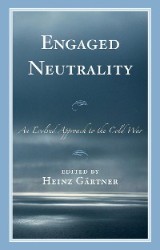Details

Engaged Neutrality
An Evolved Approach to the Cold War|
104,99 € |
|
| Verlag: | Lexington Books |
| Format: | EPUB |
| Veröffentl.: | 08.02.2017 |
| ISBN/EAN: | 9781498546195 |
| Sprache: | englisch |
| Anzahl Seiten: | 240 |
DRM-geschütztes eBook, Sie benötigen z.B. Adobe Digital Editions und eine Adobe ID zum Lesen.
Beschreibungen
<span><span>The notion that neutrality is a phenomenon only relevant to the Cold War is false in many ways. The Cold War was about building blocks, neutrality about staying out of them. From 1975 until the end of the Cold War, neutral states offered mediation and good offices and fought against the stagnation of the détente policy especially in the framework of the CSCE. After the end of the Cold War, neutral states became active in peace-operations outside of military alliances. The concept of neutrality has proven time and again that it can adapt to new situations. In many ways, small neutral states have more room to maneuver than members of alliances or big powers. They have more acceptance and fewer geopolitical interests. Neutrality has been declared obsolete many times in its long and layered history., yet it has also made many comebacks in varying forms and contexts. Neutrality in the 21</span><span><sup>st</sup></span><span> century does not involve to staying out but engaging. In contrast to disengagement and staying out, engaged neutrality entails active participation in the international security policy in general and in international peace operations in particular. Engaged neutrality means involvement whenever possible and staying out only if necessary.</span></span>
<span><span>This book examines the changing nature of neutrality from the Cold War to present day. Contributors argue that, in contrast to traditional conceptions of neutrality as disengagement, neutrality in the twenty-first century entails active participation in international security policy and peace operations.</span></span>
<ol>
<li><span>Cold War Neutrality in Europe: Lessons to be Learned? </span></li>
<li><span>From an Offer for all Cases to a Model Case?: Aspects of the Controversy about the Soviets' Germany, Austria, and Neutrality Policy, 1952-1955, in Current and Recent Research </span></li>
<li><span>The Persistence of Neutrality in Post-Cold War Europe</span></li>
<li><span>Are Neutral States Middle Powers?</span></li>
<li><span>Geopolitics and the Concept of Neutrality in Contemporary Europe</span></li>
<li><span>From Helsinki I to Helsinki II?: The Role of the Neutral and Non-aligned States in the OSCE </span></li>
<li><span>Neutrality for Peace: Switzerland's Independent Foreign Policy</span></li>
<li><span>The Common Foreign, Security and Defense Policy of the EU: Opportunities and Limitations for Neutral Member States</span></li>
</ol>
<li><span>Cold War Neutrality in Europe: Lessons to be Learned? </span></li>
<li><span>From an Offer for all Cases to a Model Case?: Aspects of the Controversy about the Soviets' Germany, Austria, and Neutrality Policy, 1952-1955, in Current and Recent Research </span></li>
<li><span>The Persistence of Neutrality in Post-Cold War Europe</span></li>
<li><span>Are Neutral States Middle Powers?</span></li>
<li><span>Geopolitics and the Concept of Neutrality in Contemporary Europe</span></li>
<li><span>From Helsinki I to Helsinki II?: The Role of the Neutral and Non-aligned States in the OSCE </span></li>
<li><span>Neutrality for Peace: Switzerland's Independent Foreign Policy</span></li>
<li><span>The Common Foreign, Security and Defense Policy of the EU: Opportunities and Limitations for Neutral Member States</span></li>
</ol>
<span><span>Heinz Gärtner</span><span> lectures at the Department of Political Science at the University of Vienna and at the Diplomatic Academy of Vienna.</span></span>

















